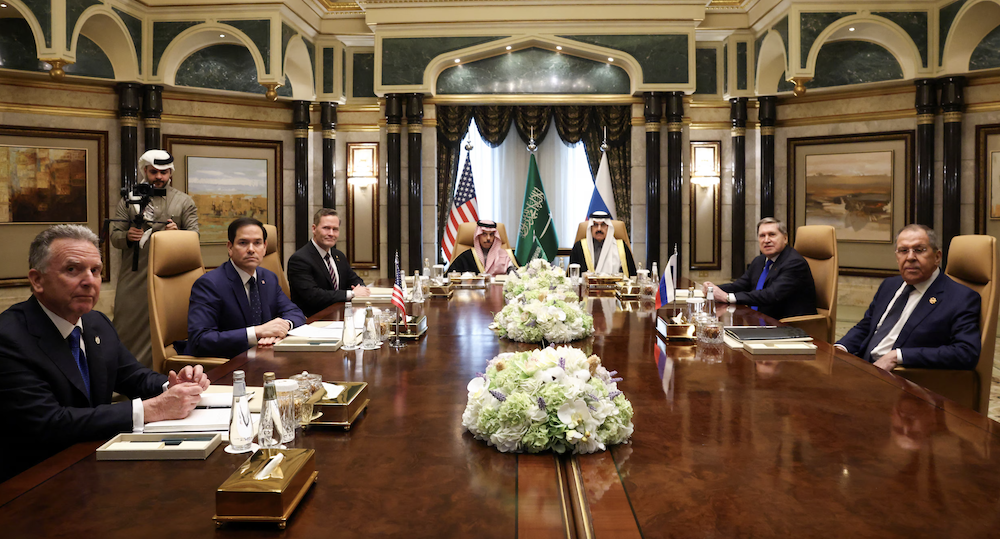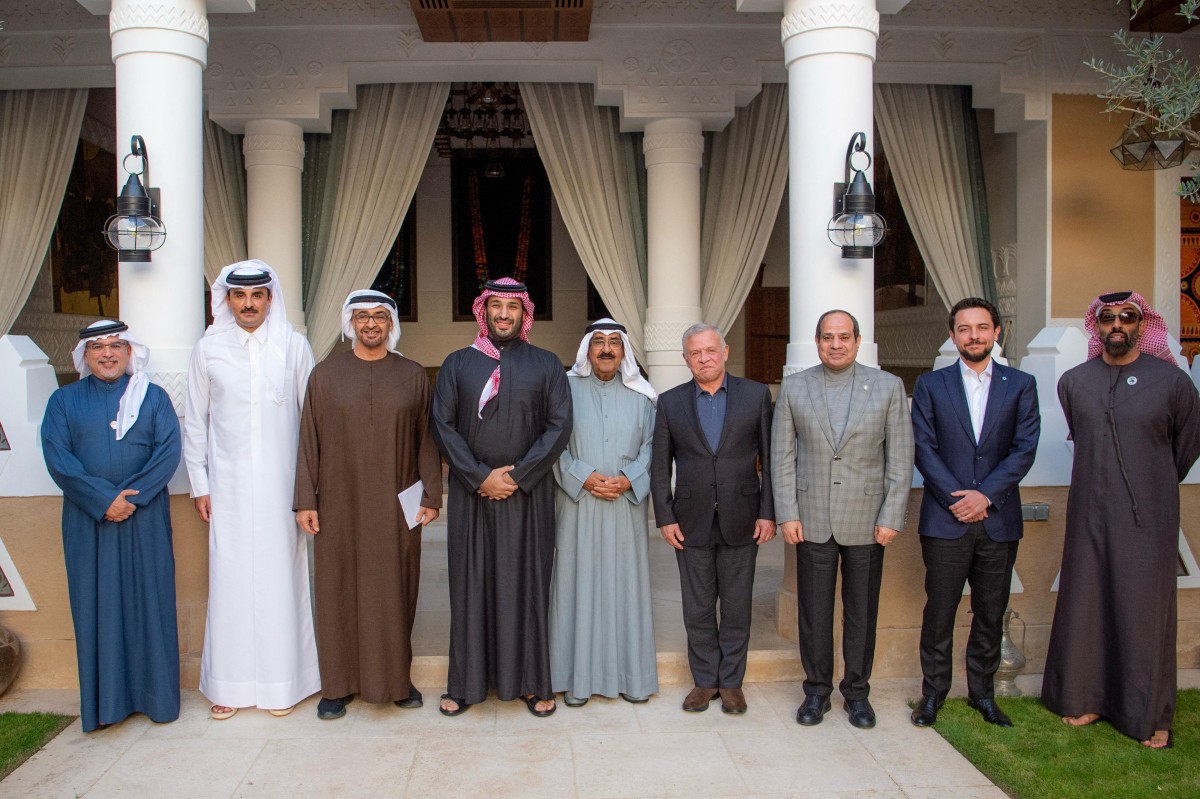RIYADH: Saudi Arabia has emerged as a pivotal diplomatic hub, a fact underscored by the recent high-level talks between the US and Russia held in Riyadh designed to re-establish fractured relations between Washington and Moscow and plot a course to ending the war in Ukraine.
Saudi Arabia brokered the talks on Feb. 18, signaling its emerging influence on the world stage. It comes amid a growing recognition of the Kingdom’s potential role as a mediator, positioning it as a crucial bridge between East and West. Further talks are expected on Feb. 25.
Appearing on the Arab News current affairs program “Frankly Speaking,” Dr. Abdulaziz Sager, founder and chairman of the Gulf Research Center, highlighted the significance of the US-Russia talks in Riyadh, noting that Saudi Arabia’s neutral stance had positioned it as an ideal convener.
“Saudi Arabia has taken an important position that has led to this meeting, which means Saudi Arabia originally refused to take a side — neither with the Russians nor with the Ukrainians,” Sager said.
Global media outlets have highlighted Saudi Arabia’s unique positioning, noting that it has maintained positive ties with both Russia and the West throughout the Ukraine conflict, which began on Feb. 24, 2022, when Russia launched what it called a “special military operation.”
CNN said Saudi Arabia’s hosting of the high-stakes rapprochement meeting between US and Russian officials “underlines the Kingdom’s aspirations to become a global actor capable of successfully mediating international conflicts.”
The US broadcaster also speculated that “another likely aim” could be pursuing “added leverage for Riyadh in future talks on the fate of postwar Gaza.”
Radio Free Europe likewise suggested the discussions represented an opportunity for Saudi Arabia “to assert its political clout after it rejected US President Donald Trump’s plan to relocate Gaza’s residents while resisting any normalization of relations with Israel.”

Dr. Abdulaziz Sager, chairman of the Gulf Research Center, spoke to Katie Jensen, host of the current affairs show “Frankly Speaking.” (AN Photo)
The fact that Riyadh “originally refused to take a side” is not to say it has condoned Russia’s behavior, nor failed to play a role in addressing the humanitarian consequences of the war, Sager said.
He noted that Saudi Arabia has consistently voted against the Russian invasion of Ukraine at the UN, contributed aid and participated in prisoner exchanges.
“In fact, they took a position that they vote in the UN for the decision against the Russian invasion of Ukraine. With the GCC countries, they have taken, also, a very firm and clear position on that subject also,” Sager said.
“They have contributed to the humanitarian issue in Ukraine. They have participated in the release of some of the prisoners also — Ukrainian prisoners from the Russian side.
“And also, they have insisted, and this was stated during the visit of the (Saudi) foreign minister to Ukraine, confirming the position of Saudi Arabia on the unity of Ukraine.”
Sager added: “Yet, Saudi Arabia never wanted to be fully on the side of either, or what the American and the European countries … (said, which was): ‘Either you are with us or against us.’
“So, they have maintained relations with Russia. They never wanted to cut relations diplomatically with Russia, because Russia has been a very important and useful partner in OPEC+.”
This balanced approach, according to Sager, has allowed the Kingdom to maintain open lines of communication with both sides, creating an environment for dialogue.
The Feb. 18 talks in Riyadh were attended by US Secretary of State Marco Rubio, National Security Adviser Mike Waltz, and Middle East envoy Steve Witkoff, and on the Russian side by Foreign Minister Sergey Lavrov, foreign policy adviser Yuri Ushakov, and head of Moscow’s Direct Investment Fund Kirill Dmitriev.
“It was a very important meeting that took place in Riyadh, attended by both the US secretary of state and the national security adviser. It brought the American and Russians together after many years when they did not get together, and also to discuss the current situation,” Sager told “Frankly Speaking” host Katie Jensen.
“And the result of that, of course, is to create a different committee between both sides to go in depth and in detailed discussion of the whole issue.”

Saudi Arabia has emerged as a pivotal diplomatic hub, a fact underscored by the recent high-level talks between the US and Russia held in Riyadh. (KSAMOFA)
While Ukraine was not directly involved in the Riyadh talks, Sager noted that Ukrainian President Volodymyr Zelensky was aware of the discussions. He also pointed to subsequent meetings in Paris involving European foreign ministers, where Ukraine was likely informed of the outcomes.
However, the absence of Ukraine from the initial talks has raised questions about inclusivity and just how sustainable a resulting peace deal might be. Zelensky has repeatedly ruled out accepting a peace deal negotiated without Ukraine.
Last Monday, European leaders held a hastily arranged summit in Paris — a day before the US-Russia talks in Riyadh — amid fears that Ukraine and Europe could be excluded from peace negotiations, raising concerns about the continent’s long-term security.
However, Sager clarified the Riyadh discussions extended beyond Ukraine, encompassing broader issues related to the US-Russia relationship.
These included the status of frozen Russian assets and sanctions, with some reports suggesting the easing of restrictions on credit card usage for Russians. Such measures could be seen as confidence-building steps aimed at fostering a more constructive dialogue.
Indeed, the Kingdom may soon play host to a face-to-face meeting between Trump and Russian President Vladimir Putin.
Looking ahead to future talks, Sager said: “Definitely, Ukraine will participate, and I think it was clearly stated by the US side (that) there will be participation from the Ukrainian side and the Europeans.”
Turning to the situation in Gaza, Sager reiterated Saudi Arabia’s unwavering commitment to the two-state solution to the Middle East conflict. He sharply criticized US proposals that involve the deportation of Gazan people and the conversion of the Palestinian territory into a real estate project.
“The Saudi position never changed,” he said. “The Saudi position is still insisting on the two-state solution. If you have another solution, tell us.”

Leaders of the GCC countries, Jordan and Egypt convened in Riyadh on Friday ahead of an emergency summit in Cairo. (AFP)
He dismissed alternative solutions as unacceptable, saying that such proposals are rejected by Arab countries. This regional consensus, he said, underscores the importance of a unified approach to resolving the Israeli-Palestinian conflict.
He also speculated that the US proposals could be aimed at achieving collective recognition and normalization with Israel, which he believes is unlikely to succeed.
“I don’t think that will happen because Saudi Arabia is leading the team, and if you remember, we had the Arab-Islamic Summit in Riyadh here, and that summit did confirm with the 57 countries attending that a two-state solution is the way forward that we will be accepting.”
Sager highlighted the widespread international support for a Palestinian state, with 149 UN member countries already recognizing it.
“The solution that President Trump presented is unacceptable,” he said. “The deportation of the people of Gaza and converting it to a real estate project — and then, there is no guarantee that they will (go) back. I don’t think this is acceptable.
“And by the way, not only Saudi Arabia but also all GCC countries along with Egypt and Jordan reject such a thing. I think he wanted to divert attention from the two-state solution, that he will put the countries in the region here in a defensive position to defend themselves from not really getting to the two-state solution that they’ve always believed in.”
Sager highlighted the importance of a unified Palestinian position, urging Hamas and other factions to participate in a unified Palestinian Authority. This call for unity reflects the belief that a cohesive Palestinian voice is essential for achieving a lasting peace.
“Definitely the Arab countries and the Arab League will ask for a unified Palestinian position, a unified Palestinian Authority,” he said.
He acknowledged the challenges posed by the designation of Hamas as a terrorist organization by some countries but suggested that individuals close to Hamas could be represented in the Palestinian Authority.
This nuanced approach recognizes the need to engage with all relevant stakeholders, even those with differing ideologies.

Dr. Abdulaziz Sager, founder and chairman of the Gulf Research Center, highlighted to Katie Jensen the significance of the US-Russia talks in Riyadh, noting that Saudi Arabia’s neutral stance had positioned it as an ideal convener. (AN Photo)
Sager also addressed the issue of ceasefires and hostage exchanges in Gaza, noting that they were taking place despite President Trump’s recent rhetoric. While acknowledging Trump’s tendency to escalate demands, he suggested that these threats often serve as a basis for compromise.
Regarding international legal cases against Israeli leaders, Sager affirmed the importance of pursuing justice and upholding international law.
He praised South Africa’s efforts in bringing a genocide case against Israel at the International Court of Justice and emphasized the need to hold perpetrators of war crimes accountable.
“I think it’s worth pursuing because in the end, we need to respect international law and we need to respect the international court. And such an effort (that) has been put by South Africa (is) highly appreciated,” said Sager.
“And remember, the G7 meeting in 2025 will take place in South Africa. So, that effort has been appreciated, and I think that matter should continue because we should not give a chance for the genocide and those (who) commit such a crime to get away with it without getting to the court and getting to the legal side.”
Looking ahead, Sager expressed cautious optimism about the Middle East, citing successful ceasefires and hostage exchanges in Gaza as positive developments.
However, he acknowledged the ongoing challenges and the need for sustained diplomatic efforts to achieve lasting peace and stability in the region, particularly in Syria, Lebanon, and Iran.
“There are many cases still open,” he said. “We have almost seven countries in an almost failed state. The situation in the Arab world, we have Yemen, Sudan, Lebanon, Syria, Iraq, Libya, and Gaza, of course, the Palestinian side, all of those, there is a huge demand for reconstruction, which can cost trillions.”
Given the uneven recovery in different parts of the Middle East and North Africa, is Sager more or less optimistic about the region’s future than he was last year?
“I’m always optimistic,” he said. “But also with optimism, with cautious optimism, I see that there is a lot of hard work (that) needs to be done to overcome a lot of those issues.”





































